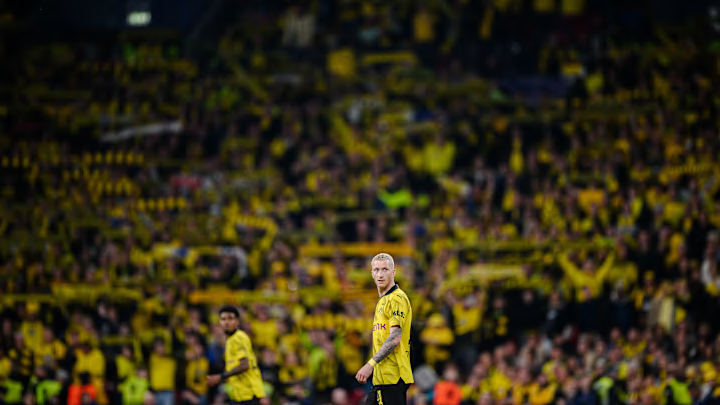For over a decade, Marco Reus represented everything Borussia Dortmund stood for: loyalty, flair, and resilience. From stunning Bundesliga defences to carrying the Black and Yellow through countless rebuilds, he became a symbol of what it means to belong. Yet, despite his brilliance, Reus was never viewed as a global superstar in the same breath as other Bundesliga greats, such as Lewandowski, Müller, or De Bruyne.
Part of that came down to timing. Injuries hit at the worst possible moments, and his decision to stay loyal to a club that could never quite conquer Europe, limited how far his reputation could spread. But for those who watched closely, Reus wasn’t just Dortmund’s talisman; he was one of the most gifted attacking players of his generation.
Now that he’s moved on to LA Galaxy, it’s worth asking whether the football world ever truly appreciated how good Marco Reus was, or if he was simply too humble to fit modern football’s definition of greatness?

His Peak Years – One of Europe’s Best
Before injuries began to shape his story, Marco Reus was among the most electrifying players in Europe. After bursting onto the scene with Borussia Monchengladbach, where his pace and precision made him one of the Bundesliga’s brightest young stars, he returned to his boyhood club, Borussia Dortmund, in 2012.
Under Jurgen Klopp, Reus thrived in a side built on energy and intensity. His debut season back in black and yellow, he produced 19 goals and 16 assists across all competitions, helping Dortmund reach the 2013 Champions League final. That campaign announced him as one of Europe’s most complete attackers: capable of creating, scoring, and leading the press with relentless intelligence.
Named German Footballer of the Year in 2012, Reus looked destined to define an era for club and country. He was fast, fearless, technically brilliant, and at his peak, every bit as decisive as Europe’s biggest stars.
The Injuries – The Story That Changed Everything
If the career of Marco Reus has a cruel undertone, it’s how often brilliance was interrupted by bad luck. Every time he reached top form, injuries seemed to arrive at the worst possible moments, robbing him of the international stage that turns great players into global icons.
In 2014, Reus missed Germany’s World Cup triumph after suffering an ankle injury in the team’s final warm-up match. It was a heartbreaking twist for a player at his peak. Two years later, he was sidelined for Euro 2016, and again during stretches of Euro 2020. By the time he returned, younger stars had taken the spotlight, and Reus’s prime years had quietly slipped away.
Yet each comeback was a reminder of his resilience. Instead of chasing a transfer or sympathy, he continued to lead Dortmund season after season. His quality never wavered, even when the spotlight occasionally did.
Loyalty in the Modern Game – His Defining Trait
If injuries shaped Marco Reus’ career, loyalty defined it. In an era where top players chase superclubs and salaries, Reus stayed loyal to Borussia Dortmund, even when every reason existed to leave.
European giants including Bayern Munich, Real Madrid, Arsenal and Manchester City all came calling, yet Reus remained at Dortmund. His reasoning was the same, Dortmund wasn’t just his club, it was home.

While Lewandowski, Götze, Hummels, Aubameyang, and Haaland all moved on in pursuit of trophies, Reus became the constant. He carried the team through rebuilds, coaching changes, and heartbreaks, captaining a side that never stopped trying to dethrone Bayern’s dominance.
Reus’ loyalty became symbolic. Not of missed opportunities, but of something football rarely values anymore, which is belonging. In a sport obsessed with brands and global reach, he stayed true to himself and his club. In doing so, he became Borussia Dortmund’s greatest constant since the Klopp era.
Global Recognition – Why Reus Is Overlooked
So why, despite his brilliance and longevity, is Marco Reus rarely mentioned among the defining players of his generation? The answer lies in timing, exposure, and perception.
Reus spent his prime years outside the spotlight of the Champions League spotlight. While stars like Neymar, Hazard, and De Bruyne built global profiles in Europe’s richest clubs, Reus stayed loyal to Dortmund. Purists admired the club, but often overshadowed by Bayern Munich’s dominance. His injuries meant fewer international tournaments, fewer global headlines, and ultimately, fewer casual fans who got to see him at his best.

He also lacked the personality-driven marketing that defines modern football icons. Reus wasn’t loud or controversial. He was professional, humble, and quietly world-class. In today’s game, that often means being underappreciated. His brilliance spoke through performances, not soundbites, and that’s partly why the world never quite gave him the credit he deserved.
The Legacy – What He Represents
When Marco Reus played his final game for Borussia Dortmund in 2024, the farewell said everything his career ever needed to. Signal Iduna Park became a sea of yellow and black, chanting the name of a player who gave them everything. Not just goals or assists, but years of loyalty, leadership, and identity.
Reus never needed a Champions League trophy to define him. His legacy lies in what he stood for: class, consistency, and devotion in an age where loyalty is rare. He was the bridge between eras, from Klopp’s chaos and heavy metal football, through Tuchel’s tactical evolution, to Terzic’s revival. Through it all, Reus remained the heartbeat of Dortmund.
In the end, maybe Marco Reus wasn’t underrated. Maybe football stopped rewarding the kind of greatness he embodied.
